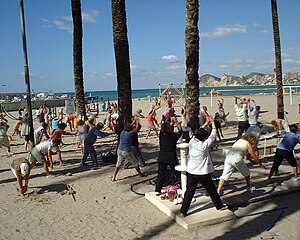Everyone knows how important exercise is to a healthy lifestyle. When we work our muscles, they stay strong and flexible. Aerobic activity works our hearts, our lungs, and burns calories. There is no question that a healthy lifestyle includes a daily dose of exercise. But did you know that hitting the gym or taking the dog for a brisk walk can also help you get the sleep you need? According to the National Sleep Foundation, physical activity is an important part of safeguarding a good night’s sleep.
1. Morning, Noon, or Night
The majority of experts agree that exercise can help you fall asleep faster and stay asleep all night. The main disagreement in this area seems to be when during the day you should exercise in order to have the most positive impact your sleep. Some people believe that working out right before going to bed wears them out and helps them fall asleep faster. Others feel that exercising in the morning is the only way to go. There are also people who believe that exercising later in the day boosts your adrenaline, gets your blood pumping, and keeps you from falling asleep.
On this topic, even the experts have differing opinions. A study completed at the Fred Hutchinson Cancer Research Center found that exercising in the morning had the most impact on the sleep of participants. The National Sleep Foundation states that exercising in the morning is good but exercising in the late afternoon can also help improve the quality of your sleep.
2. Leave Time to Cool Down
You should always warm-up before you start exercising. When it comes to how it will impact your sleep, it is important that you allow adequate time to cool down, and not just by stretching. One of the reasons experts agree that you should not exercise for three hours before bedtime is your body temperature. When you exercise, your body temperature rises which is the opposite of what you need to happen in order to fall asleep. As your body prepares to fall asleep, your core temperature decreases. Exercising too close to bed time can keep your body temperature elevated and make it difficult to fall asleep.
3. Have Good Hygiene
Exercise is a key component of good sleep hygiene, even though the recommendations all say you should be exercising earlier in the day. Some exercise, like yoga and stretching, can be done closer to bedtime because both are relaxing and don’t result in increased body heat. Good sleep hygiene is a pattern of behavior that supports consistently getting the right amount of sleep each night. This pattern includes things like waking up and going to bed at the same time each day, avoiding things like caffeine, nicotine, and late or excessive napping, and following the same bedtime routine every night.
Exercise is an important component of a solid sleep routine and the experts agree that as long as you do it consistently and early enough in the day, it can help you fall asleep faster and stay asleep all night long.
Related Articles:
- 4 Mistakes You Might Be Making that are Costing You Sleep (valleysleepcenter.com)
- 4 Common Treatments for Sleep Disorders (valleysleepcenter.com)
- Sleep Disorder Spotlight: Narcolepsy (valleysleepcenter.com)


